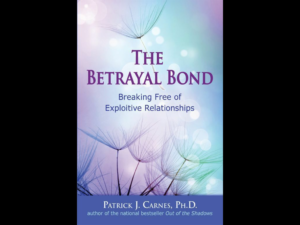
Book Intro: ‘The Betrayal Bond: Breaking Free of Exploitative Relationships’
“Betrayal bonds” or more recently understood and referred to as “trauma bonds” are relationships we find ourselves intensely bound inside of, even when overall they are destructive to our self esteem and healthy functioning.
They get created through a unique chemical cocktail involving stress hormones, bonding hormones and neuro-chemicals that support addiction. People who have experienced developmental trauma earlier in life, often find themselves trauma bonded to a partner or series of them later in life that re-create the earlier circumstances.
This book, written by Patrick J Carnes, PhD and published in 1997 remains a wonderful depth exploration of trauma bonding, explaining how they are established and maintained and includes a relationally based Post-Traumatic Stress Index for you to work through.
On Betrayal:
“Betrayal intensifies pathologically the human trait of bonding deeply in the presence of danger or fear.”
On abandonment and addiction:
“Abandonment is at the core of addictions. Abandonment causes deep shame. Abandonment by betrayal is worse than mindless neglect. Betrayal is purposeful and self-serving. If severe enough, it is traumatic. What moves betrayal into the realm of trauma is fear and terror. If the wound is deep enough, and the terror big enough, your bodily systems shift to an alarm state. You never feel safe. You’re always on full-alert, just waiting for the hurt to begin again. In that state of readiness, you’re unaware that part of you has died. You are grieving. Like everyone who has loss, you have shock and disbelief, fear, loneliness and sadness. Yet you are unaware of these feeling because your guard is up. In your readiness, you abandon yourself. Yes, another abandonment.”
Signs of trauma bonding:
Some signs of trauma bonding that Patrick describes include:
- obsessing about people who have hurt you and left
- seeking contact with people you know will cause more pain
- going all out to help people who have hurt you
- working to get people who are using you to like you
- trying to explain relationship concerns to people who don’t want to listen
- being loyal to those who have betrayed you
He describes how they can form almost instantaneously, but last forever, making survivors more vulnerable to repeated episodes of relationship abuse, often without even realising it.
Included is a wonderful graph, explaining the relationship between warmth and intention in relationships. The combination of high warmth, but low intention to genuinely care or connect or invest can create the kind of seductive scenario that can lead to anxiety, intensity, manipulation and exploitation, with risk in the relationship often being one sided.
Types of betrayal:
Various types of betrayal are discussed, including:
- Betrayal by seduction
- Betrayal by terror
- Betrayal by power
- Betrayal by intimacy
- Betrayal by spirit
Compulsive behaviours and the way forward:
The book includes a Compulsive Relationship Self-Assessment and a Compulsive Relationship Consequences Inventory, where you can take stock of the levels of how trauma bonding may be impacting you.
Guidance is provided for the paths of:
- No contact
- Limited contact
- Full relationship restoration
Dimensions of recovery
Dimensions of recovery are outlined, with examples of what that looks like for ‘no contact’, ‘limited contact’ and ‘full relationship’. The dimensions Patrick identified for trauma bond recovery are:
- Establishing healthy bonds
- Boundary development
- Role development
- Trauma resolution
- Systems change
- Strengthening sense of self
- Metaphors for a new working model
- Recovery plan
I’m a big believer that the right information and frameworks for understanding can help us hold ourselves through the difficult times and find ways forward that are genuinely healing and supportive.
rewire 4 life blog
Articles, videos and resources for healing complex and relational trauma.
